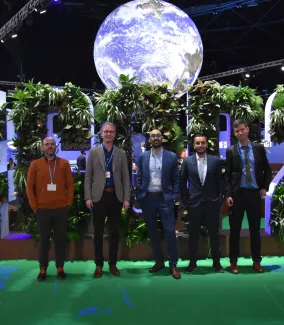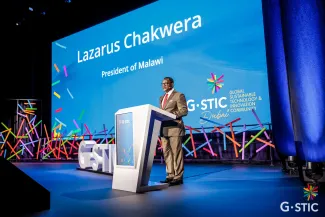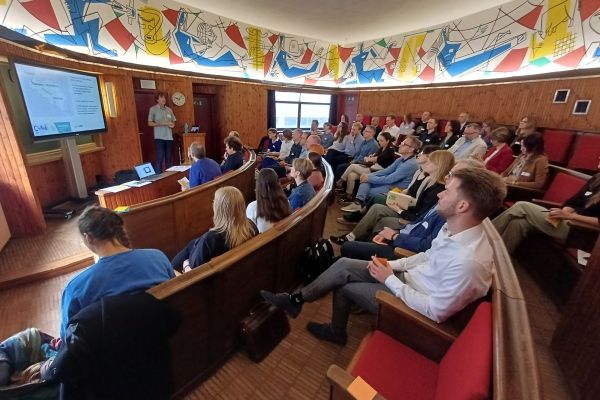VITO joins forces as a provider of integrated climate services
Countries, regions and cities are in need of integrated solutions to achieve their climate objectives and keep up their efforts, while also facing up to the consequences of global warming. VITO has particular knowledge and expertise in fields spanning the whole climate issue. As a provider in this international market, it is even better to align and integrate these climate services. VITO has put its climate services in the spotlight this past autumn, during G-STIC Dubai (at the World Expo) and during COP26 in Glasgow.

Tools robuuster maken
In recent years, VITO has developed a range of tools for mapping out the impact of climate change on e.g. agriculture, biodiversity or built-up areas. Policy-makers can use these to help equip those systems against the predicted consequences of global warming, thereby making them more robust. Climtag (for agriculture) and UrbClim (for built-up areas) are two examples of this. VITO has also developed a solution for national long-term strategies for reducing greenhouse gas emissions.
Momentum for collaboration
The fact that VITO has already developed a range of tools for climate adaptation from so many different lines of approach is further proof of its broad knowledge and expertise in climate issues. However, in the past year in particular, VITO’s experts have noticed that policy-makers - both in Belgium and abroad - are mainly expecting integrated solutions. ‘For example, if a government is interested in an energy-related service, they tend to be asking for climate adaption solutions too – better protection for built-up areas against the heat island effect, for instance, to give just one example of adaptation,’ says Maarten Lenaerts of VITO/EnergyVille. ‘Until recently, we responded to those questions on an ad hoc basis; now, we are presenting ourselves far more consciously as a provider of integrated climate services and solutions.’
This does demand closer collaboration between the various VITO units working on climate-related themes. ‘But that works for us,’ says Raf Theunissen of VITO. ‘Everyone is now looking in the same direction and there is a clear momentum for making this a lasting collaboration. We have all understood that VITO has particular knowledge and expertise in a very wide range of fields, while the international market is asking for aligned solutions. Key is to integrate that knowledge and experience.’
This integrated approach was clearly shown during the most recent edition of G-STIC, at the Dubai World Expo this autumn (October 2021). For example, during one session on the role of data in climate policy, collectively organised by the VITO units SEB and RMA, VITO employee Filip Lefebre was talking about how regions and cities in particular can equip themselves against the consequences of climate change by making use of local data of many different types. VITO has (through its Remote Sensing unit, among others) more than twenty years of experience in the production, processing and analysis of satellite imagery and this kind of climate data. Given that potential solutions in terms of climate adaptation are often related to a wide range of themes, such as energy and land use, that therefore means various VITO units could be involved in this.

Projects in Africa and in Colombia
The provisional tailpiece of VITO’s integrated climate services and solutions are the NDCs, as they are known, or national determined contributions. These are the core of the 2015 Paris Climate Agreement and show countries’ progress in terms of climate mitigation and adaptation (the reduction in greenhouse gas emissions and adjustment to consequences of climate change, respectively). ‘The focus on the NDCs helps us shape our commercial ambitions in the field of climate services at an international level,’ says Lenaerts. ‘COP26 even concluded that countries need to drive up their compliance with NDCs, which could mean they have a great deal of backlog to catch up on.’ VITO has launched the NDC Support Center over the past year. This is in collaboration with two partners: the African Regional Energy Commission (AFREC), an African Union body, and CO2logic, which was originally a Flemish climate consultancy company. Through this initiative, VITO is helping countries with their ambition to achieve the climate objectives.
The NDC Support Center
The NDC Support Center includes the foundation of a new knowledge center to support countries in Africa in their future climate reporting, particularly in terms of energy. The knowledge center began as a pilot project focusing on Morocco, Uganda and Malawi, three countries with very different economies, geography and thereby also climate impact. In addition, VITO has extensive experience with NDC projects in Colombia. VITO’s work is clearly appreciated by clients: there was a strong focus on the various projects at the climate summit in Glasgow. Flemish Minister for Energy and the Environment Zuhal Demir introduced the session on the NDC Support Center at the Benelux Pavilion. Delegates from Malawi and Morocco, as well as the NDC Partnership (of which VITO has been a member since July 2021), were also present. Another project was presented at the Colombian Pavilion, one on which VITO is collaborating with the World Bank.
Role of match-maker
VITO has now been collaborating with the World Bank for some years. This collaboration is proceeding in a very co-creative manner, whereby VITO always calls upon local partners to shape the project into a co-operative model. This approach works, given the fact that the World Bank is now structurally calling upon VITO for climate-related projects. ‘We see this as a strong recognition for us,’ says Theunissen. ‘In part because the World Bank is, of course, a highly valued player in less developed countries, which we will be hit hardest by the consequences of climate change.’

G-STIC Dubai
VITO’s connections with stakeholders in less developed countries have been producing some positive results, including for Flanders. During G-STIC in Dubai, the NDC Support Center played the role of match-maker between Flemish Prime Minister Jan Jambon and the President of Malawi, Lazarus Chakwera. Many more prominent people were also present at the sustainability event organised by VITO, such as Rashid Ali Abdallah, Director of the Energy Commission for the African Union, and Youssef Nassef, Director of the Climate Adaption Department for the United Nations. Moreover, they were not merely there to observe – quite the reverse. ‘Those prominent people gladly wanted to help present the projects we had been working on together,’ says Lenaerts.









